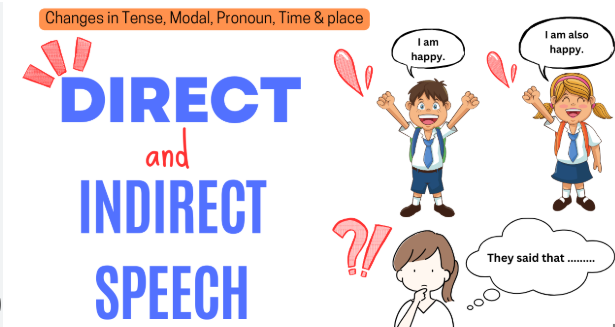Mastering Reported Speech in Class 9: A Complete Guide to Ace Your Exams
Mastering Reported Speech in Class 9 is crucial for Class 9 students, as it not only enhances their communication skills but also prepares them for higher-level grammar. In this guide, we’ll simplify the topic, provide examples, and share tips to help you excel in your exams.
What is Reported Speech?
Reported speech is a way of expressing what someone has said without quoting their exact words. Instead of direct speech (e.g., He said, “I am studying”), reported speech paraphrases the message: He said that he was studying.
Types of Reported Speech
There are two main types of reported speech:
Statements: Used to report declarations or factual statements.
- Example (Direct): She said, “I love chocolate.”
- Example (Reported): She said that she loved chocolate.
Questions: Used to convey queries.
- Example (Direct): He asked, “Where is the library?”
- Example (Reported): He asked where the library was.
Commands/Requests: Used to share instructions or pleas.
- Example (Direct): She said, “Please help me.”
- Example (Reported): She requested me to help her.

Rules of Changing Direct to Reported Speech
Tense Changes: In most cases, the tense shifts back one step in time.
- Present simple → Past simple
- Present continuous → Past continuous
- Example:
Direct: “I am happy,” he said.
Reported: He said that he was happy.
Pronoun Adjustments: Pronouns often change depending on the subject of the reporting clause.
- Example:
Direct: “I will call you,” she said.
Reported: She said that she would call me.
- Example:
Time and Place Shifts: Words like today, now, this, etc., are adjusted.
- Today → That day
- Now → Then
- Example:
Direct: “I’ll do it today,” he said.
Reported: He said he would do it that day.
No Changes for Universal Truths: General facts stay in the same tense.
- Direct: “The earth revolves around the sun,” she said.
- Reported: She said that the earth revolves around the sun.
Key Tips to Master Reported Speech in class 9
Practice Tense Shifts: Spend time converting sentences from present to past, and practice applying the correct tense changes.
Understand Reporting Verbs: Words like said, told, asked, and requested play a significant role in structuring the sentence.
Memorize Exceptions: Some expressions like could, might, and should remain unchanged when reporting.
Use Visual Aids: Create a chart showing tense changes, pronouns, and adverbial shifts. Review it regularly for better retention.
Solve Past Papers: Apply reported speech rules to real exam questions to build confidence.
Common Errors to Avoid
- Ignoring Tense Changes: Always remember to shift tenses when applicable.
- Forgetting Pronoun Adjustments: A change in the speaker often requires corresponding changes in pronouns.
- Overlooking Context: Ensure the reported sentence makes sense within the context of the conversation.
Examples of Reported Speech in Action
Let’s look at some examples to solidify your understanding:
Statement:
- Direct: He said, “I have completed my homework.”
- Reported: He said that he had completed his homework.
Question:
- Direct: She asked, “Why are you late?”
- Reported: She asked why I was late.
Command:
- Direct: “Close the door,” he said.
- Reported: He told me to close the door.
Conclusion
Mastering reported speech for Class 9 is easier than you think. By following the rules, practicing diligently, and avoiding common mistakes, you’ll not only score high in your exams but also enhance your overall language skills.
Start practicing today and watch your grammar confidence soar! Keep learning with Pinks Pathshala

